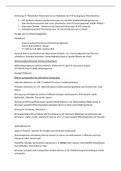Psychological Ethics
Lecture 1: Introduction to psychological ethics
Introduction to ethics
Thought experiment: the trolley problem:
- What could be the morally relevant difference between these cases, if there is any?
What do we learn?
- Illustrates we already have intuitions about morality
- But these intuitions might conflict! Compare:
o E.g., surgeon killing healthy patient to save five
o E.g., psychologist harming subject to gain insight
- Indicates conflict of values (helping/saving people vs. not harming)
- Controlled environment for inspecting and improving intuitions
- So: simple but rich, triggering philosophical questions
o E.g., What are our intuitions worth? How should we deal with conflicting
values? How should we do ethics?
,What is ethics about?
What is ethics?
- How should I act? What makes an action right?
- How should I live? What is the good life?
- But not every action is good or bad in a moral sense
o E.g., moral: trolley case, helping an old lady cross the road, lying to a friend,
fabricating data for research project
o E.g., picking flavour of ice cream, where you put your cutlery, preferring
Beyoncé over Bach, acing a math exam, choosing a romantic partner
- Boundaries of ethics can shift
o E.g., homosexuality vs. age of consent
- Actions that concern others
o But which others? All humans? Animals? Ecosystems? Future people?
o And what about myself?
- Hard to draw precise boundary: good and bad as such
Difference between ethics and morality:
- Ethics (moral philosophy): systematic reflection (beyond the intuitive) on morality
o Critical, evaluative
o As a discipline: theoretical, normative, and practical science
o Guiding, improving, developing, and evaluating morality
- Ethos (morality): the guiding ideals, attitudes and habits that characterizes a person
or community
o ‘Gut-feelings’ (based on culture, upbringing, religion, gender, etc.) and biases
o Immediate, pre-reflective response
- Systematic reflection on ethical rules and principles will ultimately become part of
our redefined intuitive sense (mutual relation)
,Ethical dilemmas
What is an ethical dilemma?
- Ethical: about morals (values, norms, principles)
- Dilemma: conflicting, contradicting morals
o No easy ‘solution’
o And not only one solution
o Downsides to all options
o Not a solution to a problem
- E.g., morals that are conflicting
Metaethics and challenges
Three main areas of ethics:
, Metaethics: challenges to ethics:
We have no free will, so there is no right or wrong
There is no God, so anything goes
Morality is fiction, we are all egotists
Morality is a lie used to control people
No action is always right or wrong, so there are no good or bad actions
What is good differs per individual/culture
We already know what is right intuitively, so we don’t need ethics
Universalism & relativism:
- Moral relativism: can explain moral diversity/disagreement but might turn
prejudice/biases into relative moral truth and doesn’t leave room for debate/ moral
progress
Lecture 1: Introduction to psychological ethics
Introduction to ethics
Thought experiment: the trolley problem:
- What could be the morally relevant difference between these cases, if there is any?
What do we learn?
- Illustrates we already have intuitions about morality
- But these intuitions might conflict! Compare:
o E.g., surgeon killing healthy patient to save five
o E.g., psychologist harming subject to gain insight
- Indicates conflict of values (helping/saving people vs. not harming)
- Controlled environment for inspecting and improving intuitions
- So: simple but rich, triggering philosophical questions
o E.g., What are our intuitions worth? How should we deal with conflicting
values? How should we do ethics?
,What is ethics about?
What is ethics?
- How should I act? What makes an action right?
- How should I live? What is the good life?
- But not every action is good or bad in a moral sense
o E.g., moral: trolley case, helping an old lady cross the road, lying to a friend,
fabricating data for research project
o E.g., picking flavour of ice cream, where you put your cutlery, preferring
Beyoncé over Bach, acing a math exam, choosing a romantic partner
- Boundaries of ethics can shift
o E.g., homosexuality vs. age of consent
- Actions that concern others
o But which others? All humans? Animals? Ecosystems? Future people?
o And what about myself?
- Hard to draw precise boundary: good and bad as such
Difference between ethics and morality:
- Ethics (moral philosophy): systematic reflection (beyond the intuitive) on morality
o Critical, evaluative
o As a discipline: theoretical, normative, and practical science
o Guiding, improving, developing, and evaluating morality
- Ethos (morality): the guiding ideals, attitudes and habits that characterizes a person
or community
o ‘Gut-feelings’ (based on culture, upbringing, religion, gender, etc.) and biases
o Immediate, pre-reflective response
- Systematic reflection on ethical rules and principles will ultimately become part of
our redefined intuitive sense (mutual relation)
,Ethical dilemmas
What is an ethical dilemma?
- Ethical: about morals (values, norms, principles)
- Dilemma: conflicting, contradicting morals
o No easy ‘solution’
o And not only one solution
o Downsides to all options
o Not a solution to a problem
- E.g., morals that are conflicting
Metaethics and challenges
Three main areas of ethics:
, Metaethics: challenges to ethics:
We have no free will, so there is no right or wrong
There is no God, so anything goes
Morality is fiction, we are all egotists
Morality is a lie used to control people
No action is always right or wrong, so there are no good or bad actions
What is good differs per individual/culture
We already know what is right intuitively, so we don’t need ethics
Universalism & relativism:
- Moral relativism: can explain moral diversity/disagreement but might turn
prejudice/biases into relative moral truth and doesn’t leave room for debate/ moral
progress



